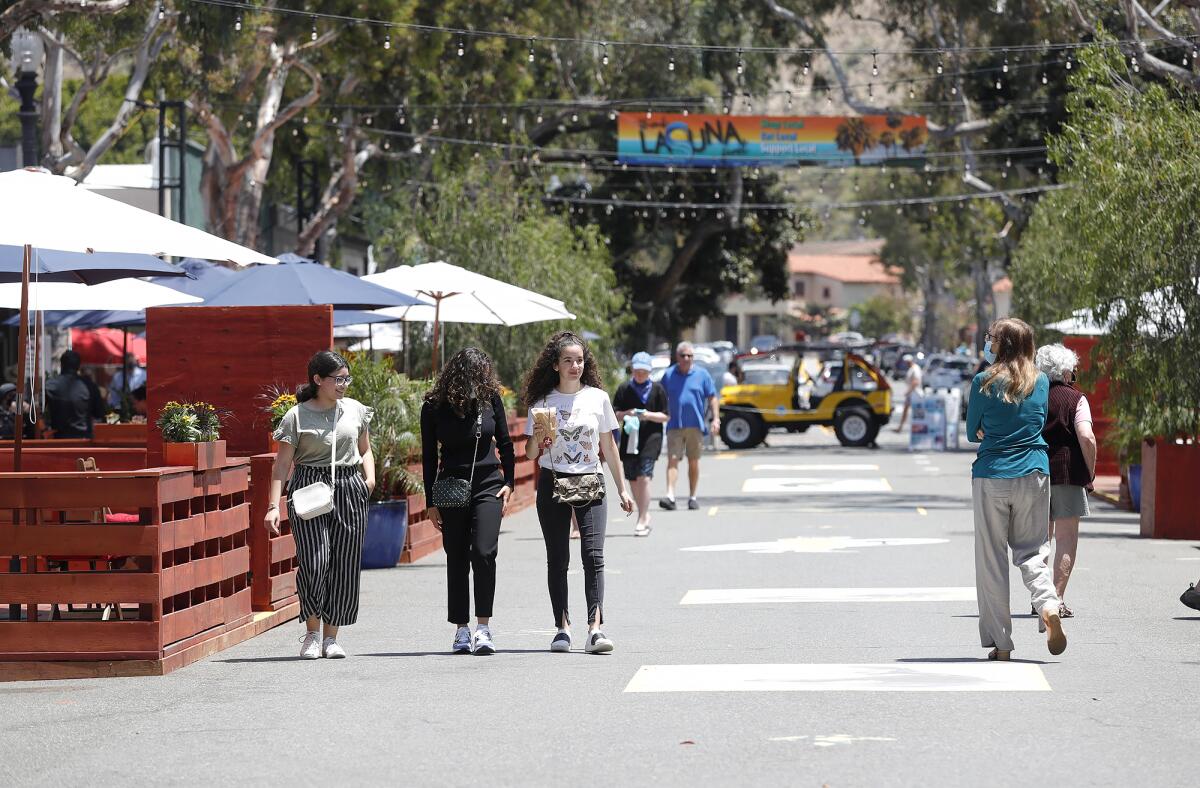Laguna Beach to relax permitting, parking standards for new businesses downtown

- Share via
In a 4-1 vote, the Laguna Beach City Council on June 16 moved to relax regulations for new businesses in the Downtown Specific Plan, a document that guides the growth, design and development standards of downtown Laguna Beach.
With Councilwoman Toni Iseman dissenting, members moved to amend some of the components of the Downtown Specific Plan to limit the requirement of a conditional use permit to businesses that have the potential to impact surrounding neighborhoods such as restaurants that serve alcohol, bars and souvenir shops. All other commercial uses would be considered permit-by-right.
Parking regulations will also be relaxed, with city staff saying that “many of the buildings in the downtown [area] were not originally developed with on-site parking, and as such, cannot accommodate new uses that would potentially increase the parking requirement” in a staff report prepared for the meeting.
The City Council first reviewed the plan in December.
Formal adoption of the changes is tentatively scheduled for July 28.
At least a dozen people commented, arguing both in favor and against the changes under consideration. Some spoke in support of both amendments, while others argued against the relaxation of the parking restrictions. Some asked that the council delay the conversation until residents can participate in person.
The change decreases the number of parking spaces required for certain nonresidential uses such as offices, retail and food service to three spaces for every 1,000 square feet of gross floor area.
The new rule counters current regulations that require one space for every 250 square feet of gross floor area for general retail and one space for every 100 square feet of gross floor area for food service usage.
Iseman raised concerns about the permit-by-right process, arguing that the council should have greater discretion over what kinds of uses should be available in the downtown area. Iseman pointed to the possibility of chain stores, saying, “How can we get visitors to shop if what we have is what they have at home?”
Discussion focused on whether or not downtown vacancies would even be attractive to potential chain stores, with the specific language and requirements guiding uses and parking. The parking modifications will apply to all existing buildings, Community Development Director Marc Wiener said.
The Planning Commission recommended the council consider modifying current permit requirements and relaxing parking requirements in the downtown area at their meeting on Feb. 26 after review of a study done by consultants Stanley R. Hoffman Associates and Stoffel Associates.
“When I was elected to council in November 2012, I think ... it was February 2013 that I was in the city manager’s office asking if we could undertake a review of the Downtown Specific Plan and here we are, what, seven years later and this is the first item that council is going to vote on,” Mayor Bob Whalen said.
“I think it’s gone through a very robust process, a very positive process,” Whalen said, adding that he supports both amendments.
“I was on the Planning Commission for four years before getting on council and I thought that at that time that ... the concept of micromanaging the contents of a store was kind of crazy,” Whalen said. “You knew a lot of times that what you were mandating was either going to be ignored somehow or lead to a business model that wasn’t successful.”
“That’s just way too much focus and control for us to have as a city,” Whalen said.
Housing, building height and parcel merger requirements for the Downtown Specific Plan will be addressed separately with the Housing Element update.
All the latest on Orange County from Orange County.
Get our free TimesOC newsletter.
You may occasionally receive promotional content from the Daily Pilot.




